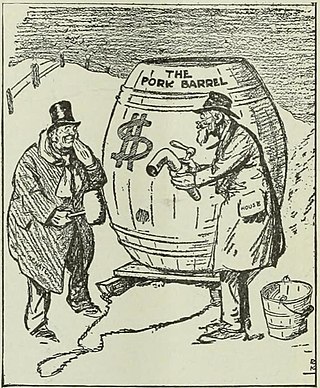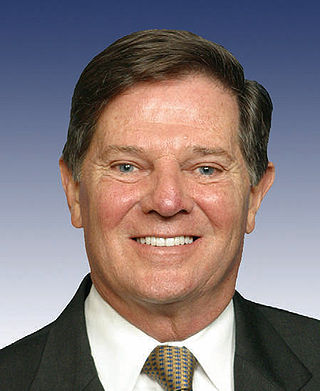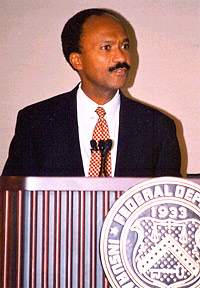
Pork barrel, or simply pork, is a metaphor for the appropriation of government spending for localized projects secured solely or primarily to direct expenditures to a representative's district. The usage originated in American English, and it indicates a negotiated way of political particularism.

Thomas Dale DeLay is an American author and retired politician who served as a member of the United States House of Representatives. A Republican, DeLay represented Texas's 22nd congressional district from 1985 until 2006. He served as House majority leader from 2003 to 2005.
Americans for Tax Reform (ATR) is a politically conservative U.S. advocacy group whose stated goal is "a system in which taxes are simpler, flatter, more visible, and lower than they are today." According to ATR, "The government's power to control one's life derives from its power to tax. We believe that power should be minimized." The organization is known for its "Taxpayer Protection Pledge", which asks candidates for federal and state office to commit themselves in writing to oppose all tax increases. The founder and president of ATR is Grover Norquist, a conservative tax activist.

Conrad Ray Burns was an American politician and lobbyist who served as a United States Senator from Montana from 1989 to 2007. He was only the second Republican popularly elected to represent Montana in the Senate and was the longest-serving Republican senator in Montana history.

John Taylor Doolittle, is an attorney and an American politician. Elected to Congress in 1990, he served as a Republican member of the United States House of Representatives from 1991 to 2009, representing California's 4th congressional district. In the 109th Congress, he held a leadership role as the Deputy Whip for the Republican party in the House. He was succeeded in the House of Representatives by Tom McClintock. Before being elected to Congress, he had served in the California State Senate from 1984 to 1991.

Ernest James "Ernie" Istook Jr. is a retired American lawyer and politician who served as a Republican member of the United States House of Representatives from Oklahoma's 5th congressional district. He held his congressional seat for 14 years, completing seven terms in the House. Currently, Istook is a Distinguished Fellow at The Heritage Foundation in Washington, D.C., and also a talk radio host. In 2010, Istook became a Fellow at the Harvard Kennedy School leading a study on Propaganda in American Politics.

Robert William Ney is an American former politician who represented Ohio's 18th congressional district in the U.S. House of Representatives from 1995 until his resignation on November 3, 2006, after he pleaded guilty to charges of conspiracy and making false statements in relation to the Jack Abramoff Indian lobbying scandal. Before he pleaded guilty, Ney was identified in the guilty pleas of Jack Abramoff, former Tom DeLay deputy chief of staff Tony Rudy, former DeLay press secretary Michael Scanlon and former Ney chief of staff Neil Volz for receiving lavish gifts in exchange for political favors.

Jack Allan Abramoff is an American lobbyist, businessman, film producer, writer and convicted criminal. He was at the center of an extensive corruption investigation led by Earl Devaney that resulted in his conviction and 21 other people either pleading guilty or being found guilty, including White House officials J. Steven Griles and David Safavian, U.S. Representative Bob Ney, and nine other lobbyists and congressional aides.
The Jack Abramoff Indian lobbying scandal was a United States political scandal exposed in 2005; it related to fraud perpetrated by political lobbyists Jack Abramoff, Ralph E. Reed Jr., Grover Norquist and Michael Scanlon on Native American tribes who were seeking to develop casino gambling on their reservations. The lobbyists charged the tribes an estimated $85 million in fees. Abramoff and Scanlon grossly overbilled their clients, secretly splitting the multi-million dollar profits. In one case, they secretly orchestrated lobbying against their own clients in order to force them to pay for lobbying services.

David Safavian is an American former lawyer who worked as a congressional aide, lobbyist, and later as a political appointee in the George W. Bush administration. A Republican, he served as Chief of Staff of the United States General Services Administration (GSA). He is a figure in the Jack Abramoff lobbying scandal, having worked with the lobbyist on the Mississippi Band of Choctaw account. After serving with Abramoff as a lobbyist, in 1997 Safavian co-founded lobbying firm Janus-Merritt Strategies with Republican activist Grover Norquist.
Citizens for America (CFA) was a United States conservative grass-roots organization founded by President Ronald Reagan's "Kitchen Cabinet" to support President Reagan's national defense and economic initiatives. CFA called itself "President Reagan's Lobby" and was led first by drugstore magnate Lewis E. Lehrman and later by Gerald P. Carmen, who had served as administrator of the General Services Administration (GSA) and U.S. ambassador to the United Nations mission in Geneva, Switzerland. CFA was organized as an IRS 501 (C) (3) and (4) non-profit. Among the early employees was Jack Abramoff, who was later terminated for cause.
"Team Abramoff" is the team of lobbyists assembled by Jack Abramoff when he worked at Greenberg Traurig, primarily of former aides to prominent Congressional politicians. Their work is embroiled in the Jack Abramoff scandals.

Thomas Charles Feeney III is an American politician from Orlando, Florida. He represented Florida's 24th congressional district. He was defeated in the 2008 election by Democrat Suzanne Kosmas.

Lobbying in the United States is paid activity in which special interest groups hire well-connected professional advocates, often lawyers, to argue for specific legislation in decision-making bodies such as the United States Congress. It is often perceived negatively by journalists and the American public; critics consider it to be a form of bribery, influence peddling, or extortion. Lobbying is subject to complex rules which, if not followed, can lead to penalties including jail. Lobbying has been interpreted by court rulings as free speech protected by the First Amendment to the U.S. Constitution. Since the 1970s, the numbers of lobbyists and the size of lobbying budgets has grown and become the focus of criticism of American governance.

The Jack Abramoff CNMI scandal involved the efforts of Jack Abramoff, other lobbyists, and government officials to change or prevent, or both, Congressional action regarding the Commonwealth of the Northern Mariana Islands (CNMI) and businesses on Saipan, its capital, commercial center, and one of its three principal islands.
An earmark is a provision inserted into a discretionary spending appropriations bill that directs funds to a specific recipient while circumventing the merit-based or competitive funds allocation process. Earmarks feature in United States Congress spending policy, and they are present in public finance of many other countries as a form of political particularism.

The Countrywide financial political loan scandal in 2008-2009 involved U.S. politicians who allegedly received favorable mortgage rates.

Tobacco politics refers to the politics surrounding the use and distribution of tobacco, likewise with regulations.

Joseph Albert "Trey" Hollingsworth III is an American businessman and politician who served as the U.S. representative for Indiana's 9th congressional district from 2017 to 2023. A member of the Republican Party, Hollingsworth served on the House of Representatives Financial Services Committee. Hollingsworth was the vice ranking member of the House Financial Services Committee Subcommittee on Investor Protection, Entrepreneurship, and Capital Markets and a member of the House Financial Services Subcommittee on Diversity and Inclusion.














